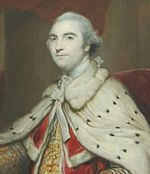How to Pronounce William Petty, 2nd Earl of Shelburne
#50
Most Popular
Boost
May 02, 1737 Dublin, Leinster, Ireland Died on 07 May 1805 (aged 68)
British Prime Minister
TaurusWilliam Petty 2nd Earl Of Shelburne, Date of Birth, Place of Birth, Family, Facts, Age, Net Worth, Biography and More in FamedBorn.com

British Prime Minister
Taurus